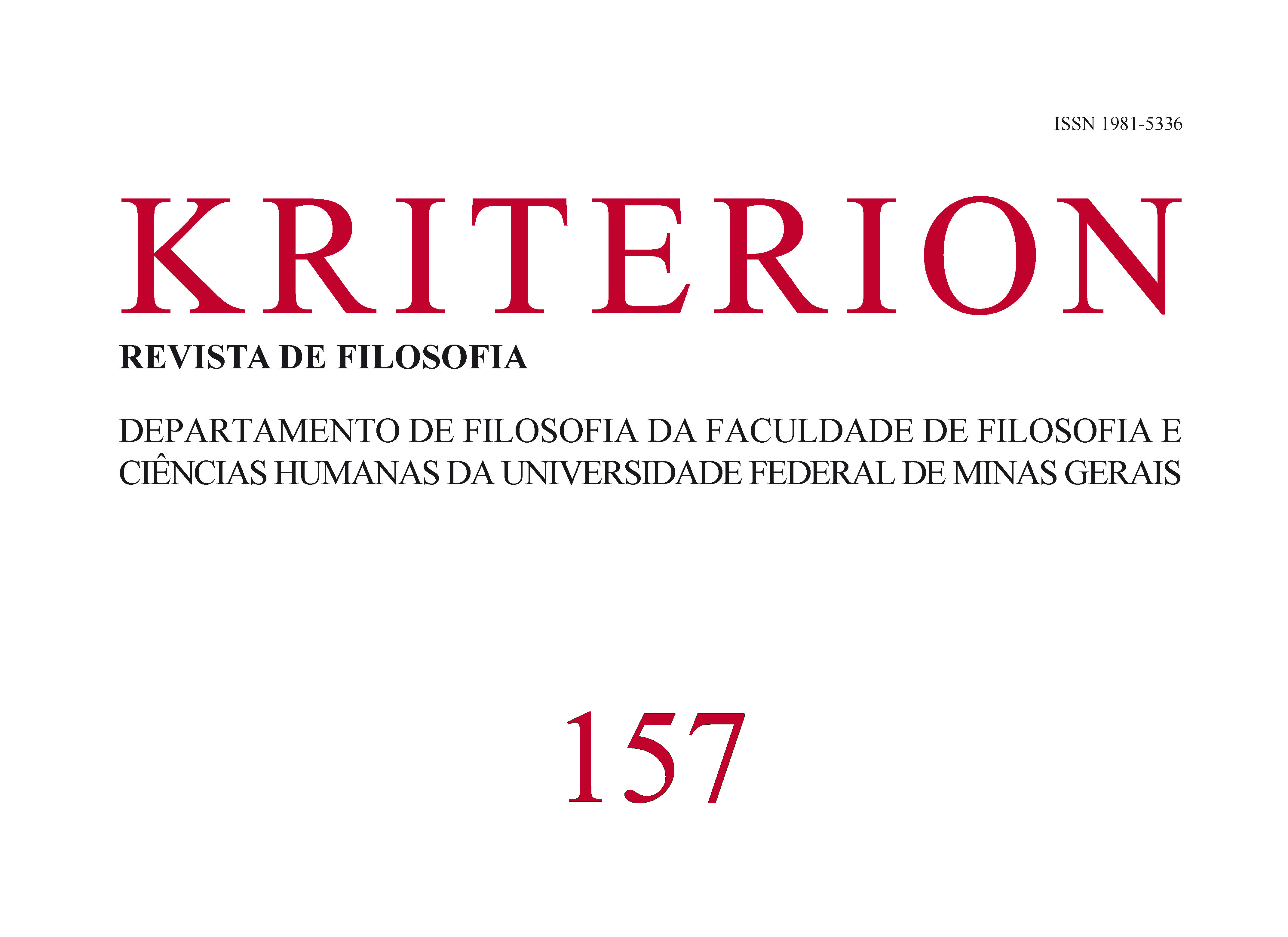SENTIMENTALISMO ENATIVO AVALIATIVO
Palavras-chave:
Afetividade, Enativismo, Affordances, Sentimentalismo AvaliativoResumo
Defendo uma versão de sentimentalismo avaliativo segundo a qual (i) respostas afetivas são aparências de valor e (ii) juízos de valor podem repudiar ou assentir a essas aparências. O ponto de partida do meu argumento é a concepção enativa de afetividade de Giovanna Colombetti. De acordo com Colombetti, um ser afetivo é um que, por meio de sua atividade de produção de sentido, traça distinções significativas, permeadas de valores e, assim, produz um Umwelt (isto é, um ambiente que tem um significado específico para ele). Os elementos desse Umwelt impactam o ser afetivo como significativos e ser assim impactado é ter uma resposta afetiva. Nesse sentido, respostas afetivas podem ser caracterizadas como aparências de valor. Sustento que as aparências de valor são melhor compreendidas como percepções de affordances. Essa tese tem consequências para nossa compreensão de juízos de valor. Os conceitos avaliativos que são relevantes para nós devem corresponder a distinções que são significativas para nós. Assim, conceitos avaliativos relevantes devem capturar o significado de elementos do Umwelt que afetam o organismo. O resultado é que o significado que juízos de valor atribuem a seus objetos pode coincidir com o significado com o qual o objeto nos é apresentado em uma resposta afetiva.
Referências
ARNOLD, M. B. “Emotion and Personality”. New York, NY: Columbia University Press, 1960.
BAGGS, E., CHEMERO, A. “Radical embodiment in two directions”. Synthese, 198(S9), pp. 2175-2190, 2021. https://doi.org/10.1007/s11229-018-02020-9.
BRUINEBERG, J., CHEMERO, A., RIETVELD, E. “General ecological information supports engagement with affordances for ‘higher’ cognition”. Synthese, Vol. 196, Nr. 12, pp. 5231-5251, 2018.
______. “Radical Embodied Cognitive Science”. Cambridge: The MIT Press, 2009.
BRUINEBERG, J., RIETVELD, E. “Self-organization, free energy minimization, and optimal grip on a field of affordances.” Frontiers in Human Neuroscience, 8(AUG), pp. 1-14, 2014. https://doi.org/10.3389/fnhum.2014.00599.
CHEMERO, A. “Radical Embodied Cognitive Science”. Cambridge: The MIT Press, 2009.
COLOMBETTI, G. “The feeling body: Affective science meets the enactive mind”. MIT Press, 2014. https://doi.org/10.5860/choice.52-0767.
______. “Enactive Affectivity, Extended”. Topoi, Vol. 36, Nr. 3, pp. 445-455, 2015. https://doi.org/10.1007/s11245-015-9335-2.
DI PAOLO, E. A. “Autopoiesis, adaptivity, teleology, agency”. Phenomenology and the Cognitive Sciences, 4, pp. 97-125, 2005.
______. “Extended life”. Topoi, 28, pp. 9-21, 2009.
DI PAOLO, E., DE JAEGHER, H., CUFFARI, E. C. “Linguistic Bodies: the continuity between life and language”. The MIT Press, 2018.
DRETSKE, F. I. “Explaining Behavior: Reasons in a World of Causes”. Cambridge, MA: MIT Press, 1988.
GIBSON, J. J. (1979). “The ecological approach to visual perception”. Boston: Houghton, Mifflin and Company, 2015.
GRIFFITHS, P. “Towards a ‘Machiavellian’ theory of emotional appraisal”. In: EVANS, D., CRUSE, P. (eds.). Emotion, Evolution, and Rationality. Oxford: Oxford University Press, 2004.
GRIFFITHS, P., SCARANTINO, A. “Emotions in the Wild: The Situated Perspective on Emotion”. In: ROBBINS, P., AYDEDE, M. (eds.). The Cambridge Handbook of Situated Cognition. Cambridge University Press, 2009.
HEFT, H. “Ecological Psychology and Enaction Theory: Divergent Groundings”. Frontiers in Psychology, 11(May), pp. 1-13, 2020. https://doi.org/10.3389/fpsyg.2020.00991.
HERAS-ESCRIBANO, M. “Pragmatism, enactivism, and ecological psychology: Towards a unified approach to post-cognitivism”. Synthese, 2019. https://doi.org/10.1007/s11229-019-02111-1.
HUTTO, D. D., MYIN, E. “Evolving enactivism. Basic minds meet content”. Cambridge: The MIT Press, 2017.
LAZARUS, R. S. “Emotion and Adaptation”. New York: Oxford University Press, 1991.
MATURANA, H., VARELA, F. “Autopoiesis and Cognition: the realization of the living”. Dordrecht: D. Reidel Publishing Company, 1980.
MYIN, E., VAN DEN HERIK, J. C. “A twofold tale of one mind: revisiting REC’s multi-storey story”. Synthese, 198, pp. 12175-12193, 2021. https://doi.org/10.1007/s11229-020-02857-z.
NUSSBAUM, M. C. “Upheavals of Thought: The Intelligence of the Emotions”. Cambridge: Cambridge University Press, 2001.
PRINZ, J. “The Emotional Construction of Morals”. Oxford University Press, 2007.
RIETVELD, E., KIVERSTEIN, J. “A Rich Landscape of Affordances”. Ecological Psychology, Vol. 26, Nr. 4, p. 325-352, 2014.
ROLLA, G., FIGUEIREDO, N. “Bringing forth a world, literally”. Phenom Cogn Sci, 2021. https://doi.org/10.1007/s11097-021-09760-z.
SCARANTINO, A. “Affordances Explained. Philosophy of Science”, 70, pp. 949-971, 2003.
______. “The motivational theory of emotions”. In: J. D’Arms, D. Jacobson (eds.). Moral psychology and human agency: Philosophical essays on the science of ethics. Oxford University Press, 2014. pp. 156-185. https://doi.org/10.1093/acprof:oso/9780198717812.003.0008.
SCHERER, K. R. “Appraisal Theory”. In: T. Dalgleish, M. J. Power (eds.). Handbook of Emotion and Cognition. Chichester: New York, 1999. pp. 637-663.
SHARGEL, D., PRINZ, J. “An enactivist theory of emotional content”. The Ontology of Emotions, pp. 110-129, 2017. https://doi.org/10.1017/9781316275221.007.
THOMPSON, E. “Mind in Life: Biology, Phenomenology, and the Sciences of Mind”. Cambridge, MA: Harvard University Press, 2007.
______. “Reply to commentaries”. J Conscious Stud, Vol. 18, Nr. (5-6), pp. 5-6, 2011.
THOMPSON, E., STAPLETON, M. “Making sense of sense-making: Reflections on enactive and extended mind theories”. Topoi, 28, pp. 23-30, 2009.
UEXKÜLL, J. von (1934). “A Foray into the Worlds of Animals and Humans. With a Theory of Meaning”. Trans. J. D. O’Neill. Minneapolis: University of Minnesota Press, 2010.
WEBER, A., VARELA, F. J. “Life after Kant: Natural purposes and the autopoietic foundations of biological individuality”. Phenomenology and the Cognitive Sciences, 1, pp. 97-125, 2002.
WITHAGEN, R., ARAÚJO, D., DE POEL, H. J. “Inviting affordances and agency”. New Ideas in Psychology, 45, pp. 11-18, 2017.
Downloads
Publicado
Edição
Seção
Licença
Copyright (c) 2024 Revista Kriterion

Este trabalho está licenciado sob uma licença Creative Commons Attribution 4.0 International License.










